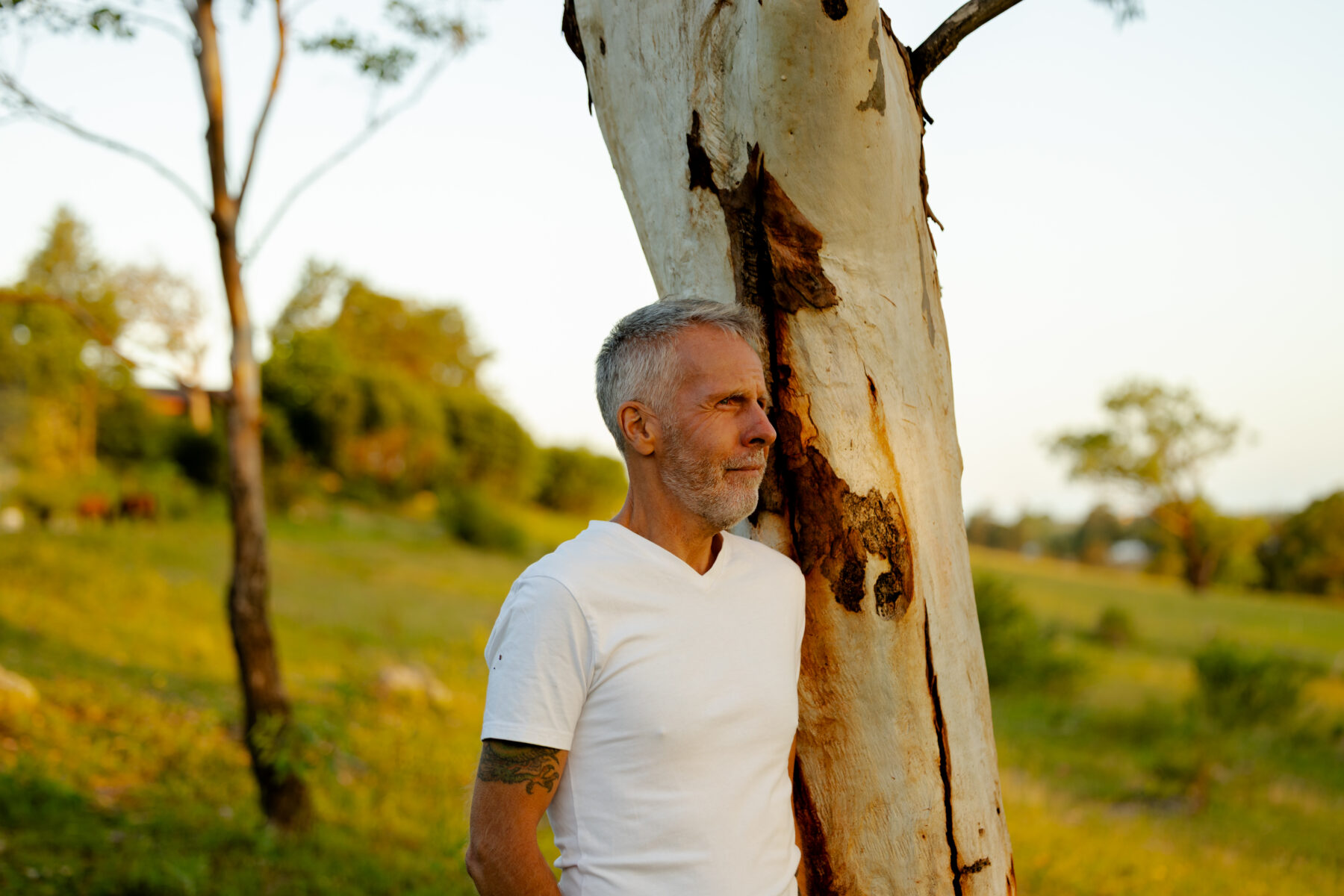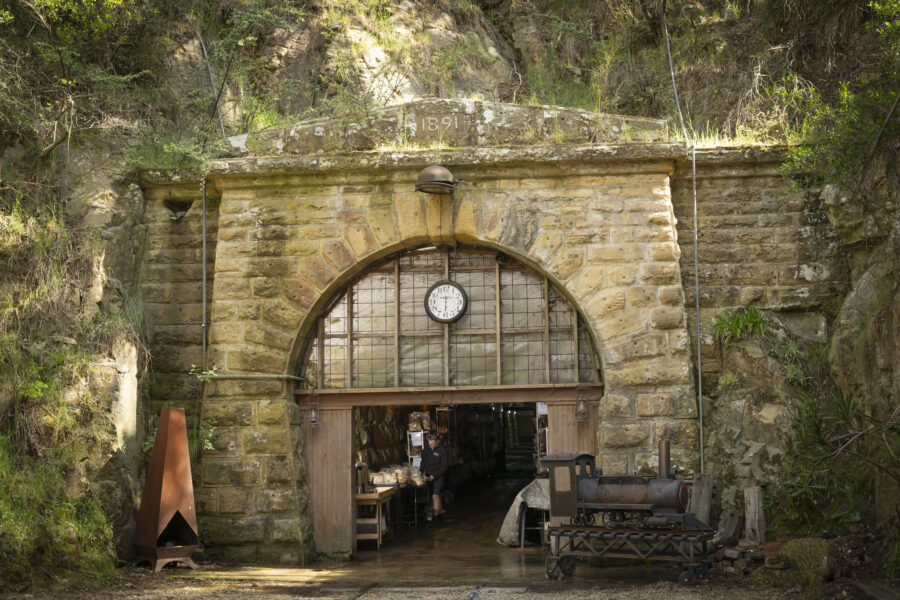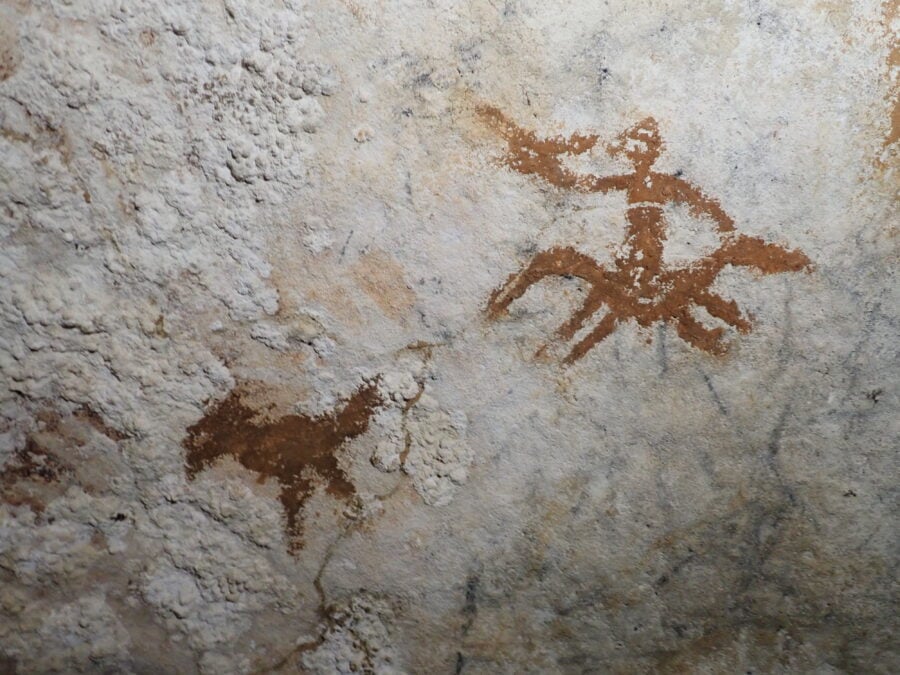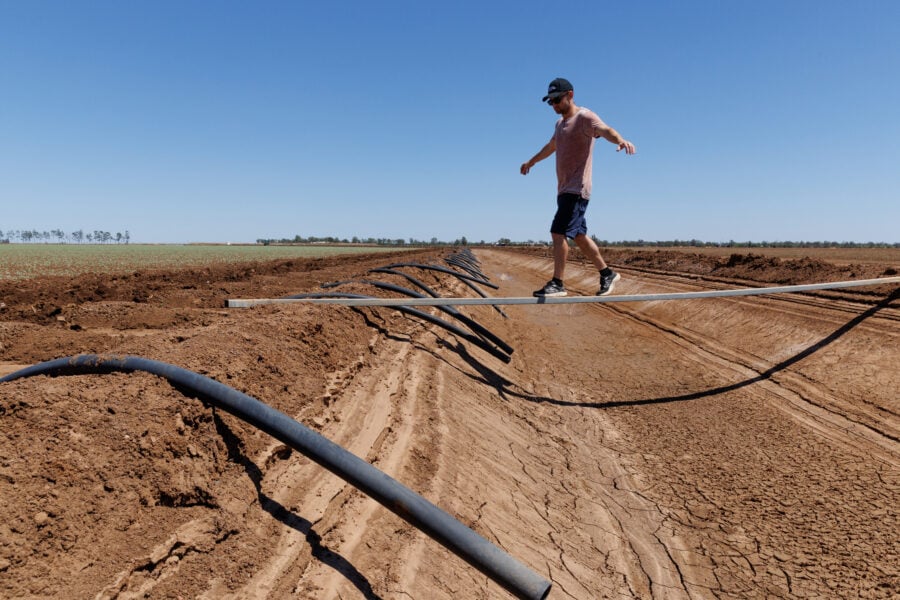Content warning: This article includes discussion of suicide and sexual violence.
In regional Queensland, a group of blokes sit around a campfire. There’s laughter and banter – the easy camaraderie of men who’ve walked similar paths. But between their boisterous stories, there are quieter moments: tears, fears, and the kind of honesty rarely voiced in everyday life.
These men have come together through a men’s circle led by Aaron Schultz of The Outback Mind Foundation. They’re here to connect, and they’re also here to save lives.
Aaron is known to many in this part of Australia due to a giant billboard on the Bruce Highway between Miriam Vale, where he’s now based, and Gladstone. His face is splashed across it, arms folded, alongside the message: ‘DV stops with me.’ On average, almost 7000 vehicles pass it each day.
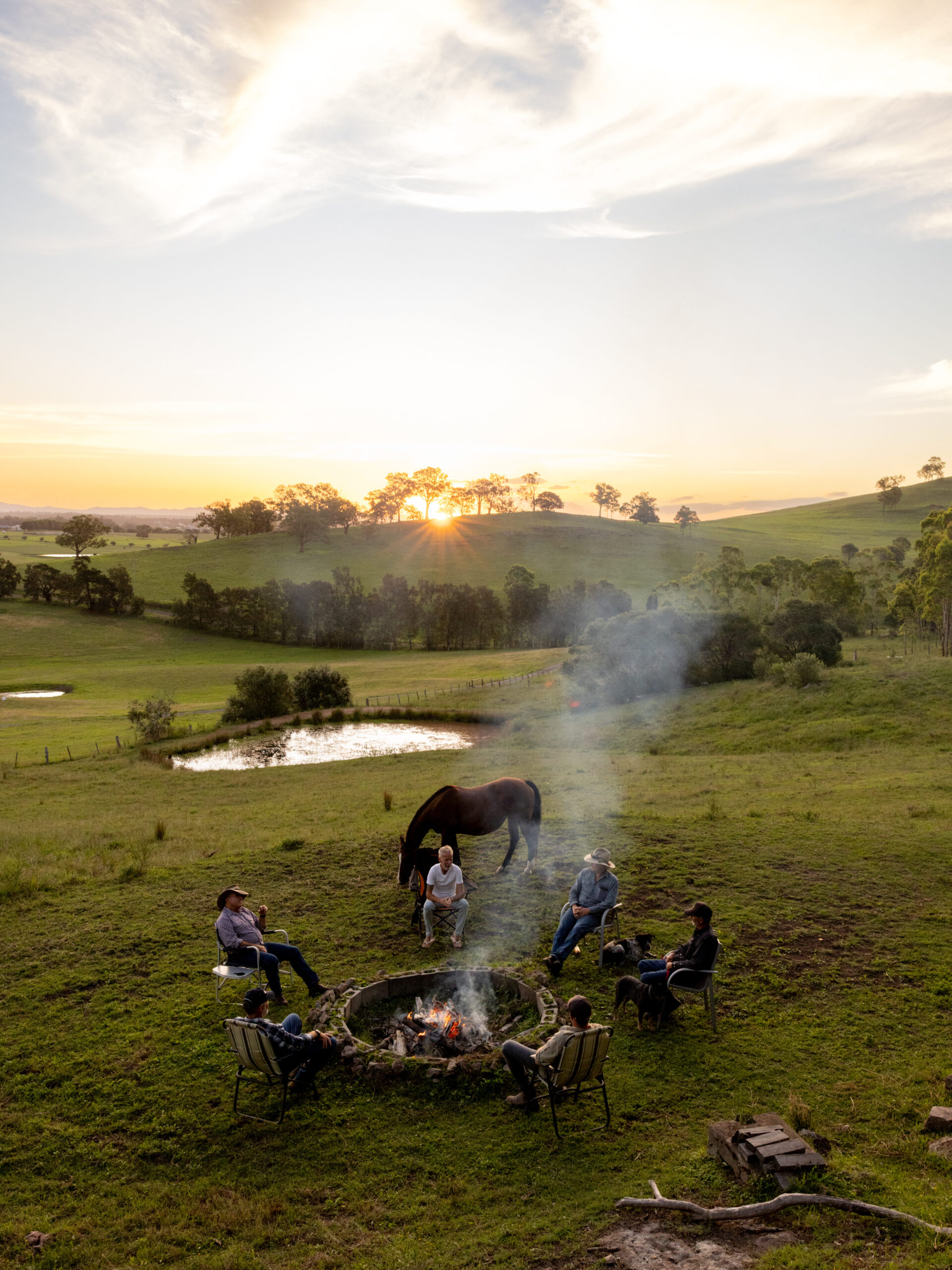
But billboard fame aside, Aaron is an ordinary bloke. He grew up in an ordinary country town, with ordinary parents and ordinary friends. He played sports on weekends and drank beers in the local pub. He took the ordinary life path of marriage, kids and work. He had arguments with his wife and faced challenges in his career. He could be any man.
Beneath the surface, however, Aaron was carrying unspoken weight: traumas of his own, some intergenerational, all suppressed and unexpressed. The pressure built slowly, clawing at his emotional stability, leading him to angst and, eventually, to suicidal thoughts. He suffered in silence.
Today, Aaron runs The Outback Mind Foundation, a charity dedicated to helping ordinary men like himself. The Outback Mind saves lives: men’s lives, women’s lives, and children’s lives.
“I was close to checking out,” says one of the men sitting around that campfire. “But I found comfort in strangers who listened to problems I’ve never talked about.” Across the circle, another adds: “I was worried I was going to do something to my family. But through Outback Mind, I’ve changed.”
Aaron is a positive role model championing the struggles of regional men. But before he brought light, he faced the dark.
The need for mates
Out in Western Victoria’s Wimmera region, where wheat grows and sheep graze on extended plains, the large town of Horsham sits on the bend of the Wimmera River. Imagine Aaron, aged 14, swimming here with his mates. It’s the early 1980s – when pushbikes relied on effort rather than electricity – and they’ve pedalled here after a Saturday playing cricket. Cicadas are in high chorus, the waters are warm, and the beers are illicit. Across the country, hundreds of teenagers are doing the same.
Drinking was the normal thing to do, Aaron recalls. “Dad would have a few beers every night,” he says. “Mum drank and smoked. Every social activity involved alcohol, and by the time I was in my early teens, I was drinking [too]. I didn’t really want to, but I felt it was the only way to fit in. It was a way of connecting to people.”
On the cusp of manhood, a seemingly innocuous remark at a cricket match struck deep into Aaron’s heart. “A friend of my father’s had been drinking, and when I walked into the clubhouse, he turned and said, ‘You’re gonna be a dickhead like your old man.’ I was shocked, and when I took it to Dad, he brushed it off.” It left Aaron feeling bereft of positive male support.
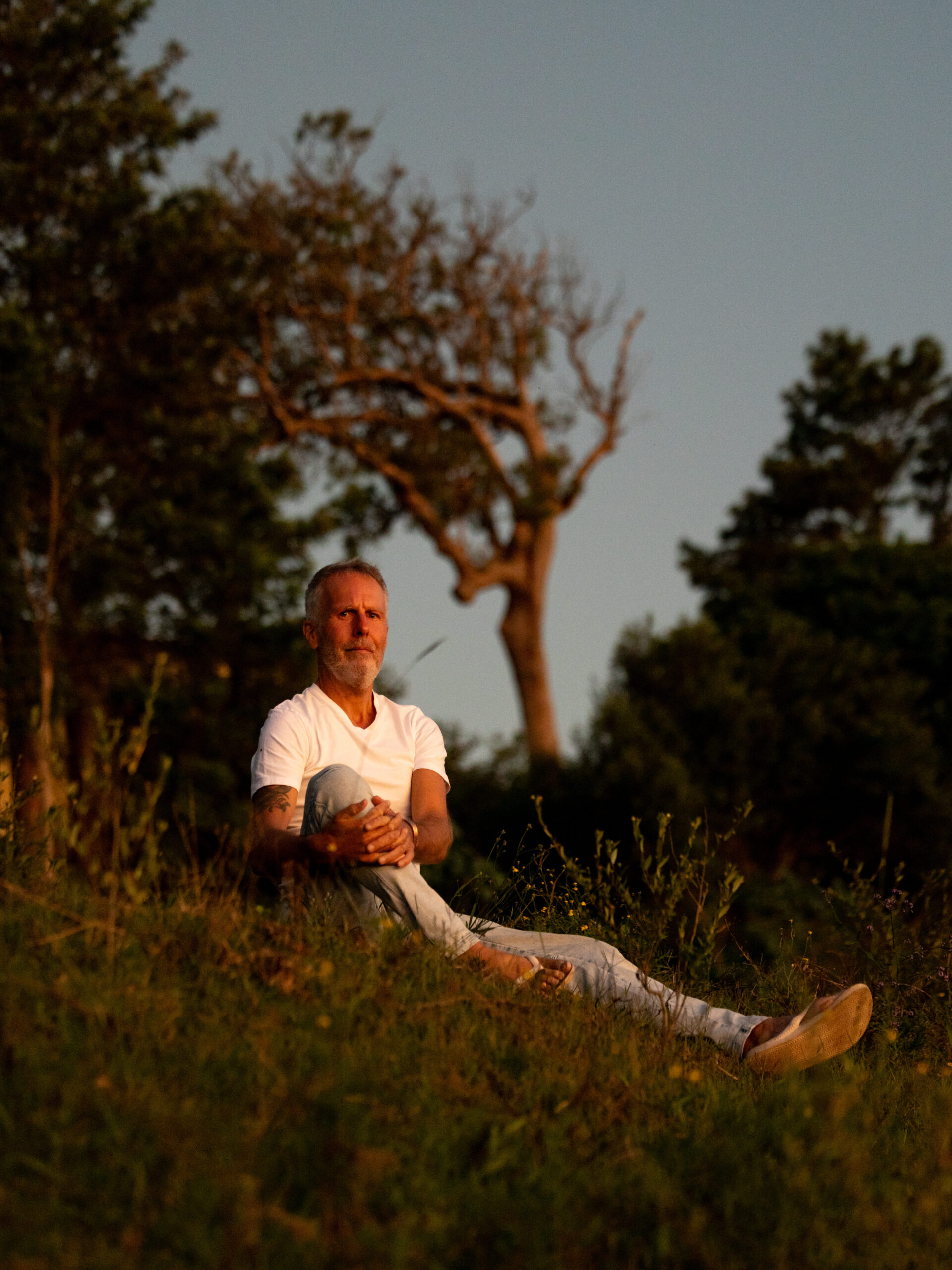
Later, his mate Damien drove him home one evening and spoke of death. “I knew something was wrong, but I just said ‘you’ll be right’ and went to bed,” Aaron says. Damien shot himself that night. “I could have done more for him. He opened up to me, and I didn’t respond.”
Then, in his early 20s, Aaron lost his licence because of drink driving and was publicly shamed on page three of the local Horsham paper. “But no-one ever asked me why I was acting this way; no-one showed understanding or compassion,” he says.
Trying to shake his past and reclaim his life, he did what most young men do: he moved to a larger town (Shepparton). He poured himself into the corporate world. He married and had children, bought the good house, played cricket on weekends, drank alcohol some more. He did what was expected of him. He became a provider.
He moved his family to Tasmania for his work in corporate labour hire. He was successful, but was then made redundant. He returned to the same industry, was successful, and then made redundant again when the global financial crisis hit. He drank more. He verbally abused his wife in front of his two sons. He had suicidal thoughts.
“I was brought up with the mindset that you don’t complain. You keep working. You don’t look weak. And when you celebrated, you drank. When you were fatigued, you drank. When you were sad, you drank,” Aaron says. “But that was just suppression. We don’t help men develop emotional depth. We set them up to fail.”
And then this ordinary man took himself to a doctor and asked for help. It was a turning point in his life.
Enabling change
Wanting to be a better father to his kids and to give them a positive male role model, Aaron told the doctor he was struggling. He was given the option of medication or exercise. He chose exercise. He gave up the grog and hit the gym every morning at 4am. He cycled, and paddled, and ran and ran and ran, often clocking up 140km in a week. After two years, he became a fitness coach for the Tasmanian cricket team.
“I transformed from someone with low self-esteem and self-belief, and from being your average male – unfit, probably unhealthy in many ways – to being incredibly fit and strong. And it changed my whole relationship with myself. It allowed me to start to move through anger to forgiveness,” he says.
Aaron then went to work on his mind. He went to a Buddhist centre in Hobart and learnt meditation. It was here that he started his first men’s circle, allowing men to talk, to let go of their ego and to heal. He returned to Horsham and taught yoga to footballers and netballers, earning their respect by being fitter than them. And it was in Horsham that he realised the trauma he was carrying was not only his own.
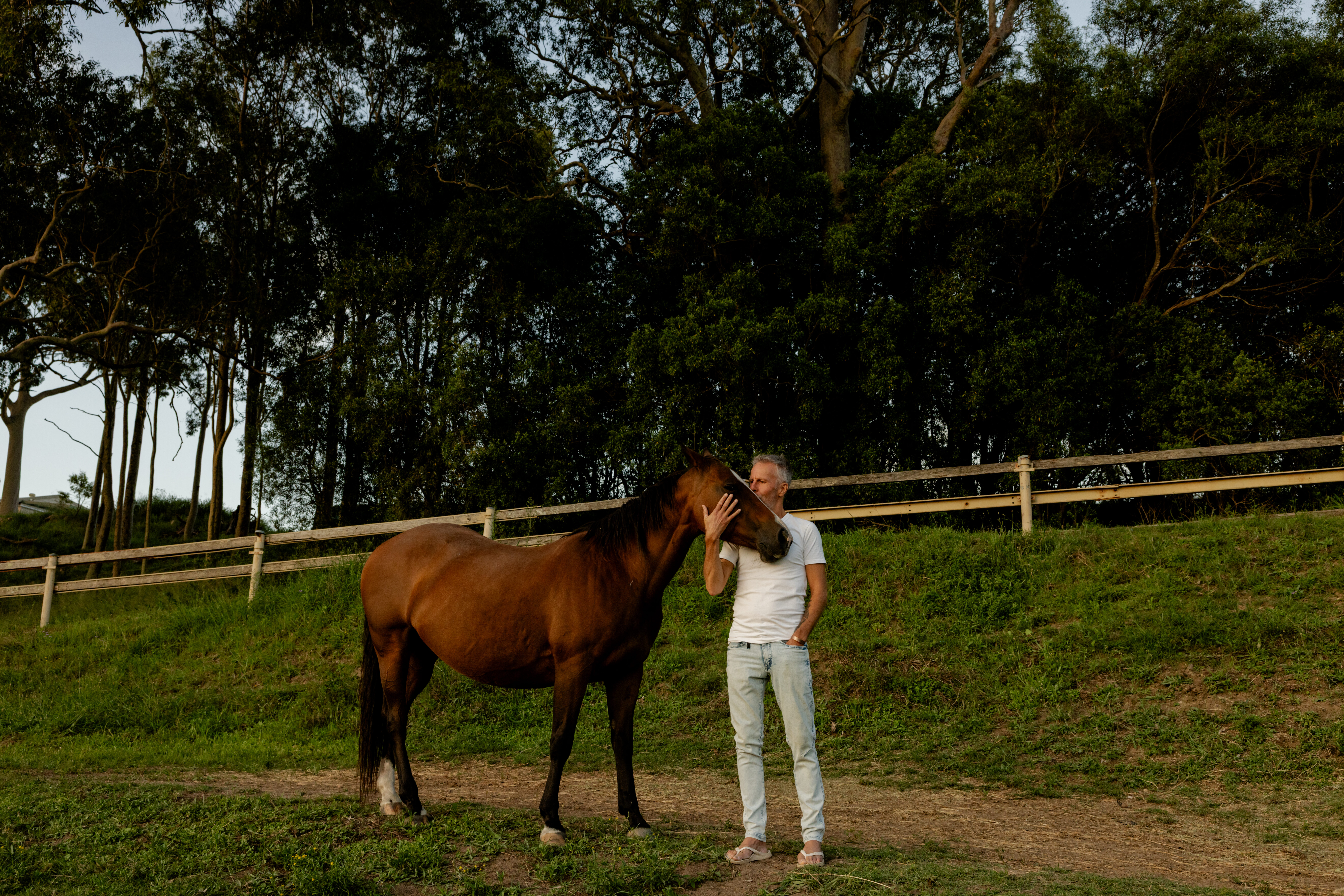
On his mother’s deathbed, Aaron met a stepbrother he never knew existed. “I found out Mum had been hiding a brutal past,” he says. “When she was 20, she was gang-raped by six men at the Horsham train station. From that, she had a baby who was adopted. She felt ashamed, and she had suppressed that her whole life. And that’s when I came to understand intergenerational trauma. But by then, I knew I could be angry, or I could be compassionate. I chose to be compassionate, and I wondered how things might have been different if those young men had been more emotionally conscious. Maybe then these things wouldn’t have happened.”
This line of thought led Aaron to establish The Outback Mind in 2019 with the aim of healing men’s minds. While some mental health programs may be reactive, The Outback Mind works to be proactive to support good mental health. Leaning into his rural upbringing, Aaron focuses on regional communities – where child custody and relationship issues are common – and has established 20 men’s circles across the eastern seaboard. These are safe places for men to talk, to keep each other accountable, and to address issues that may otherwise downward spiral to domestic violence or suicide.
Australian former international rugby league player Darius Boyd – who has had his own public battle with the challenges of mental health – is an enthusiastic advocate. “Aaron’s men’s circles give support in remote spaces where access to services may be harder to achieve,” Darius says. “And sometimes you get more out of the vulnerability and sharing of stories, and knowing you’re not alone, than you do with professional services. A chat and a conversation, and knowing the feelings and emotions we have are normal and okay, means we can lean on each other to bounce back.”
Sometimes you get more out of knowing you’re
Aaron Schultz, founder of The Outback Mind Foundation
not alone than you do with professional services.
The statistics around domestic violence and male suicide are chilling. In Queensland alone, in 2024, there were 24,255 applications for protection orders, and police commenced proceedings against 29,382 breaches. Meanwhile, in Australia, approximately nine lives are lost to suicide every day, with 75 per cent of those being men, and a significant percentage occurring in rural communities.
The Outback Mind asks men to be the solution. In 2024 Aaron travelled to 50 rural towns, running free events that included the circles and screenings of his impactful documentary Boiling Point, which addresses domestic violence and in which, he says, even the “blokey blokes” can see themselves. A second documentary, When the Dust Settles, premiered in August and takes a hard look at male suicide.
Operating on a shoestring budget – there’s less than $30,000 in the bank for travel and resources, and Aaron volunteers most of his time – The Outback Mind works with employers, particularly in male-dominated industries, and with schools. “We can’t keep just raising awareness. We need to educate and change,” Aaron says. “We need a comprehensive emotional intelligence program to roll out in workplaces and schools to normalise this education and to promote healthy masculinity. It will produce better communities, better lives and better social outcomes.”
It’s why, on a Bruce Highway billboard between Miriam Vale and Gladstone, you’ll see Aaron’s face and those words: ‘DV stops with me’. He’s holding himself accountable and inviting other men to come along on the journey. “I know we can flick the switch and help men develop better emotional literacy,” he says. “Now is the time to make change.”
More information: outbackmind.org.au
If this article has raised any issues or concerns for you or someone you know, support is available at:
-Lifeline: 13 11 14, lifeline.org.au
-Beyond Blue: 1300 224 636, beyondblue.org.au
-1800RESPECT: 1800 737 732, 1800respect.org.au
-Suicide Call Back Service: 1300 659 467, suicidecallbackservice.org.au
-MensLine Australia: 1300 78 99 78, mensline.org.au
-SANE Australia: 1800 187 263, sane.org
-ReachOut: au.reachout.com
-QLife: 1800 184 527, qlife.org.au
-Headspace: 1800 650 890, headspace.org.au
-Kids Helpline: 1800 650 890, kidshelpline.com.au
